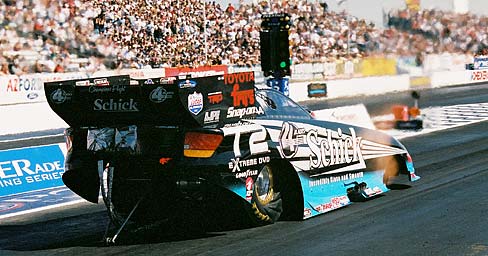|


DRO: Is it
one sponsor or two sponsors?
TOLIVER: Oh,
it's a couple. One very large primary sponsor.
But that's all I can say at this point, as much
as I would love to brag about it. They've got
some issues they have to work through. We were
trying to announce this way back at SEMA (the
SEMA show last fall). There have been a lot
of rumors, because we've been trying to put
something together for quite awhile, to resurrect
this whole Celica program. I can tell you that
Toyota and TRD are extremely excited about our
new program. Alan started the deal with Whitecap
in 2002 with Gary driving, then Sarver took
over, and they had good results. They were in
five finals in the short period of time they
were out there.
DRO: Scelzi
went 11 rounds and reached one final, and Sarver
took it 34 rounds, including four finals. Sarver
also was top qualifier at Topeka, the first
Chicago event and the second Las Vegas race.
TOLIVER: The
car actually showed a lot of promise. Alan's
technology has advanced to the point these Toyota
Celicas can be very, very competitive.
DRO: Was Toyota
aggressive about trying to get back in on the
Nitro drag-racing scene? I mean, Toyota was
the first foreign manufacturer to enter NHRA
competition and has stayed active, in the Sport
Compact Series, with its Solaras, Supras and
Celicas.
TOLIVER: Alan
and I resurrected this entire project on our
own.
DRO: Did you
have to get Toyota re-interested?
TOLIVER: Toyota
was always interested. The program showed a
lot of merit to them. They got a lot of good
feedback, so it was very exciting to them internally
to do this drag racing program. So we went back
to them and said, "Look, we've got a deal,"
and they were extremely excited.
DRO: Are you
working with Mark Amstock and TRD?
TOLIVER: Mark
[Toyota national marketing manager] is involved
and so is Jim Aust [Toyota V.P. of Motorsports].
It's been a great collaboration. They're really
good people, and I'm excited about working with
them and really bringing to them a quality sponsor.
Don't get me wrong, money is money. The Whitecap
deal wasn't a real strong program. The size
and scope of the program we're going to bring
in is going to be national. It's a very big
company.
DRO: Let's
back up a bit. What happened to the WWF sponsorship?
TOLIVER: Let's
go back to another era. WWF stopped its sponsorship
in 2001. That's when their contract ran to,
the end of 2001. They had a couple of options
to extend it but they decided not to. The reason
for that is pretty simple. First off, we were
in a bad economic time in 2001. Then we had
9/11. WWF's core business was down. They went
into the XFL. As everybody knows, the XFL was
not successful. It was a big cash drain on the
company. It put a big hurt on them. So they
said, "We have to pull our wings back in and
refocus on our core business and do what we
do best," which is their wrestling program.
And they did that. All the people we went in
under with the racing program were gone. They
whacked their staff by about 20 percent. They
pulled the reins in. Now, don't get me wrong.
They treated us extremely well. We have no regrets
with those people. I really wish I could have
raced with them forever. It's unfortunate it
just didn't work out for me.

|